The Fariña Files | home
Vanguard collectors' guide | Vanguard Labels | Title 67 | Vanguard Singles, 1960-1970 | Vanguard - selected discographies | Vanguard - 1960-1970 | Dick & Mimi's LPs - a guide | Dick & Mimi's LPs: Singer/Songwriter | Dick & Mimi's LPs : Reflections In a Crystal Wind | SF Chronicle obit, from AVRS-21354 | Reflections photo session | Dick & Mimi's LPs - Memories | Dick & Mimi's LPs- The Best of... | Farina : Covers & Oddities | Elektra - selected discography | Selected contemporary discography
Dick & Mimi's LPs: Singer/Songwriter
" with dulcimer and guitar accompaniment"
|
Hajdu notes that this album was recorded in New York City during September and October of 1965. However, other sources indicate the record was released in September of 1965, displacing the recording sessions by at least a couple of months. It's more likely the songs were recorded earlier, and could have been done anywhere during the spring or summer of that year, as the Fariñas were then living and performing on the east coast. Most likely date would be late March or early April when they were in NYC recording with Judy Collins for her Fifth Album. Long rumored to be Dick accompanied by Bruce Langhorne, it now seems to have been an unbilled Mimi (which, while unkind to Mimi on all fronts, would actually have fit into the album's concept of the singer/songwriter performing solo or with unnamed accompaniment).
|
 |
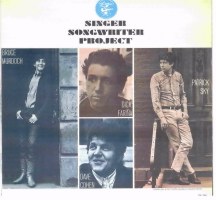 |
 |
First label, 1965, mono
|
LP cover, mono
|
2nd label, circa 1966 (stereo)
|
The cover photo of Fariña was taken in NYC in a Greenwich Village alley doorway, in the spring or summer of that year by the noted folk photographer, David Gahr. This is from the same session as the one used on the back of Been Down So Long. And again on the 80s Penguin version of the novel.
Since there were only about 3 or 4 offical photo sessions in the two and a half years of Dick & Mimi's short career, the photos used during their careers and certainly since, all tend to look familiar and very similar. Hence, Dick's wearing the same wool-lined leather jacket as on the cover of the first album, probably the same black turtle neck (also used on their second LP), and in the full photo, he's standing in the same brown corduroy Levis and black Beatle boots as he wore onstage that year on Sunday, at the Newport Folk Festival. And all looking as though they just came back from the dry cleaners.
|
 Faith Sale, a friend since his college days, took a look at the photo on the back of the hardcover of Beem down so long... and said "God, I know that look. If you look at the pictures of Dick, it's always the same look : he was always posing." She said he had a fixed number of poses, and if you looked at enough pictures, you'd see the same faces over and over. Faith Sale, a friend since his college days, took a look at the photo on the back of the hardcover of Beem down so long... and said "God, I know that look. If you look at the pictures of Dick, it's always the same look : he was always posing." She said he had a fixed number of poses, and if you looked at enough pictures, you'd see the same faces over and over. |
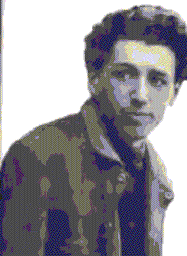 |
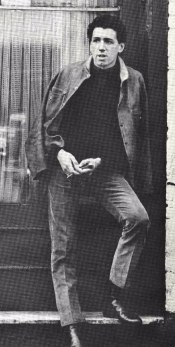 |
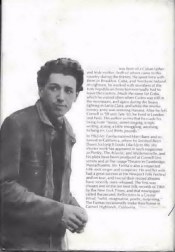 |
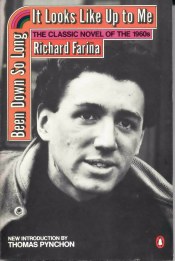 |
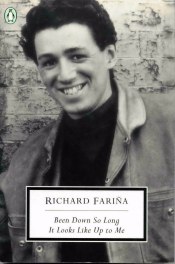 |
Elektra "Special Albums" series
|
|
 EKS-7264 : Blues Project
 EKS-7292 : String Band Project
|
This was done as one of a series of original anthology recordings Elektra Records did in between 1964-65, combining traditional songs with contemporary performers. Other releases included :
The Blues Project ( released 1964 : EKL-264 / EKS-7264), featuring Geoff Muldaur, Dave Ray, John Koerner, Eric von Schmidt, Dave Van Ronk, Danny Kalb, Ian Buchanan and Mark Spoelstra;
The Old Time Banjo Project (released 1964 : EKL-276 / EKS-7276), with a band comprised of John Cohen, Bob Siggins, Hank Schwartz, Peter Siegel, Bill Vanaver and Winnie Winston;
The String Band Project (released 1965 : EKL-292 / EKS-7292), featuring The Mother Bay State Entertainers, John & Penny Cohen, The Dry City Scat Band, Stu Jamison's Boys and Uncle Willie's Brandy Snifters (all old timey or bluegrassers local to the green and fertile valleys of New York City or Boston).
Honorable mention should be made for their earlier LP, Folk Banjo Styles ( released 1963 : EKL-217 / EKS-7217), which, though done under the same philosophy and format (and featuring mostly banjo solos by Tom Paley, Eric Weisberg, Tom Rosenbaum and Marshall Brickman), was probably the prototype for the Projects series and so was never included in the Elektra catalog as a "special album", as the others were.
|
Who got what, where and when
|
And the result......
|
The album itself was the idea of label boss Jac Holzman, who was able to borrow Fariña and Patrick Sky from Vanguard, while using Murdoch and Cohen from the Elektra stable. Bruce Murdoch was a 17 year-old Canadian guitar player who also appeared on Elektra's 1965 sampler (SMP-78 / S-78) repeating one of his songs from this album and there are rumors of a single released at this point, but Elektra seems never to have given him an album all his own - he had to wait until the 70s to release his solo 33 and 1/3 Revolutions Per Minute on a Richie Haven's Stormy Forest label in 1971 ( SFS-6006). Dave Cohen became David Blue and released his first solo album on Elektra (EKL-4003 / EKS-74003), as well as two on Reprise in the late 60s and a slew on Asylum into the 70s. Patrick Sky was in his early 20s and had already released his debut album on Vanguard (Patrick Sky,VRS-9179 / VSD-79179), as well as having established his writing credentials when Buffy Sainte-Marie recorded his "Many A Mile" (rerecorded for this album by Sky) as the title track from her second album. Sky recorded two albums and several singles for Vanguard between 1965-66, before moving to Verve for several years, then Adelphi, and eventually Shanachie in the mid-80s.
|
  |
Ó 2002, 2003, 2010 Greg Pennell
last updated 8 feb'10
|